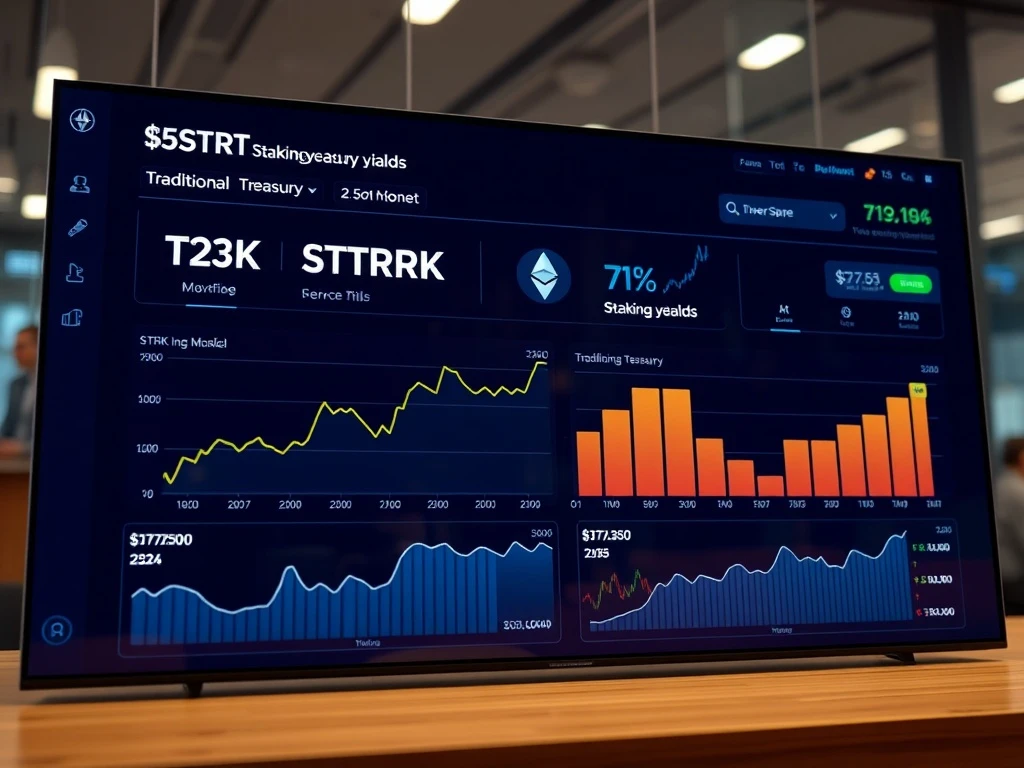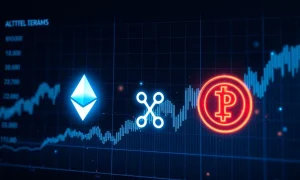Institutional investors are rapidly discovering a powerful yield advantage: STRK staking now delivers returns that significantly outpace traditional U.S. Treasury bonds. This development marks a pivotal moment for digital asset adoption among major financial players seeking superior returns in today’s competitive market environment.
STRK Staking Revolutionizes Institutional Yield Strategies
Anchorage Digital, a federally chartered crypto bank, now offers STRK staking services with a compelling 7.28% APR. This move directly addresses growing institutional demand for digital asset yield generation. Consequently, traditional Treasury yields of 4.0-4.5% appear increasingly inadequate by comparison. Financial institutions now recognize STRK staking as a viable alternative for capital deployment.
Why STRK Staking Attracts Major Institutions
Several key factors drive institutional adoption of STRK staking. First, Starknet’s layer-2 technology provides Ethereum scaling solutions through zero-knowledge proofs. Second, the network’s security model allows token holders to contribute directly to network protection. Third, rewards mechanisms offer consistent returns that outperform traditional options. Finally, regulatory clarity through licensed custodians reduces institutional risk concerns.
Competitive STRK Staking Landscape Emerges
Platforms like Super now offer astonishing 21% APR for STRK staking with daily compounding. This aggressive yield strategy highlights growing confidence in layer-2 infrastructure. Importantly, these platforms provide:
- Daily reward distributions for consistent returns
- Flexible withdrawal options maintaining liquidity
- Non-custodial infrastructure ensuring security
- Audited smart contracts reducing technical risk
Federal Reserve Policy Boosts STRK Staking Appeal
Market expectations of Federal Reserve rate cuts significantly enhance STRK staking attractiveness. With a 94% probability priced in for September cuts, traditional yields may decline further. Meanwhile, crypto staking returns remain robust regardless of monetary policy changes. Institutions consequently allocate more capital to blockchain infrastructure yields.
Global Institutional Adoption Accelerates
Switzerland’s Sygnum Bank pioneered Ethereum staking services in 2021. Other firms like Komainu and Liquid Collective subsequently introduced liquid staking products for major blockchains. This global trend normalizes crypto staking as legitimate yield-generating tools. Institutional participation therefore continues expanding across jurisdictions.
STRK’s Evolving Ecosystem Value Proposition
The STRK token serves multiple critical functions within Starknet’s ecosystem. It facilitates governance participation, enables transaction fee payments, and now secures network operations through staking. This multifunctional utility strengthens its long-term value proposition. Ethereum’s scaling needs further support STRK’s fundamental importance.
FAQs: STRK Staking for Institutional Investors
What makes STRK staking different from traditional bond investing?
STRK staking offers higher yields (7.28%-21% APR) compared to Treasury bonds (4.0-4.5%), while providing exposure to blockchain infrastructure growth.
How do institutions mitigate risks with STRK staking?
Licensed custodians like Anchorage Digital provide regulated custody services, audited smart contracts, and insurance coverage, reducing counterparty and technical risks.
What determines STRK staking reward rates?
Reward rates depend on network participation levels, tokenomics, platform competition, and overall demand for Starknet’s layer-2 scaling solutions.
Can institutions access staked STRK liquidity?
Yes, platforms like Super offer 24-hour liquidity options, while liquid staking solutions are developing for institutional-scale requirements.
How does STRK staking impact network security?
Institutional staking increases network decentralization and security by distributing validation responsibilities among diverse, professional participants.
What regulatory considerations affect institutional STRK staking?
Federally chartered banks like Anchorage Digital operate within existing regulatory frameworks, providing compliance assurance for institutional participants.








